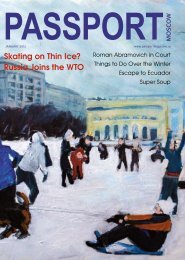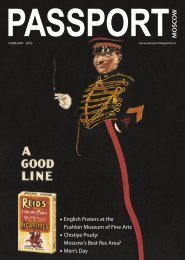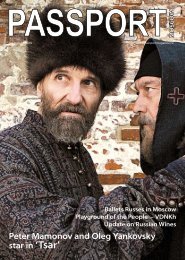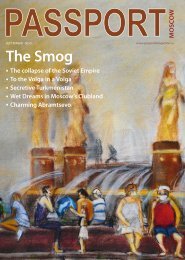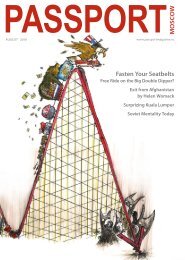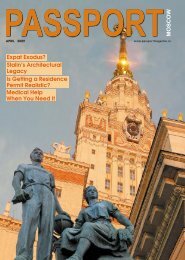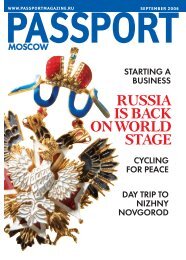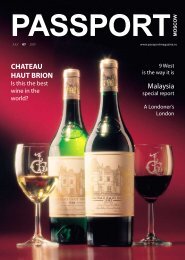Part one of Passport's guide to Moscow's favorite - Passport magazine
Part one of Passport's guide to Moscow's favorite - Passport magazine
Part one of Passport's guide to Moscow's favorite - Passport magazine
Create successful ePaper yourself
Turn your PDF publications into a flip-book with our unique Google optimized e-Paper software.
text by Yuri Pushkin<br />
It is hard <strong>to</strong> feel at home in your own<br />
country when the popular expression <strong>of</strong><br />
who and what you are is “unnatural”. Such<br />
is the reality for gays and lesbians living<br />
in Moscow and all across Russia’s eleven<br />
time z<strong>one</strong>s. After the collapse <strong>of</strong> the Soviet<br />
Union, Russia has certainly turned in<strong>to</strong><br />
a more democratic and free nation. Along<br />
with a more open society came the legalization<br />
<strong>of</strong> homosexuality. Still, free speech<br />
appears <strong>to</strong> be more <strong>of</strong> a privilege than a<br />
right, denied <strong>to</strong> any<strong>one</strong> whose opinions<br />
or lifestyles vary from what is considered<br />
normal, including gays and lesbians.<br />
Such was the case on May 16 when<br />
dozens <strong>of</strong> gay and lesbian rights activists<br />
attempted <strong>to</strong> stage a protest rally on <strong>to</strong>p<br />
<strong>of</strong> Moscow’s Sparrow Hills <strong>to</strong> bring attention<br />
<strong>to</strong> the human rights violations in the<br />
country. As in years past, the city’s Mayor<br />
Yury Luzhkov banned any demonstrations<br />
from taking place claiming that homosexuality<br />
is “satanic” and “helps spread the<br />
AIDS virus”. Led by Russia’s prominent gay<br />
rights activist Nikolai Alexeyev, UK human<br />
rights activist Peter Tatchel and American<br />
Andy Thayer, co-founder <strong>of</strong> the Gay Liberation<br />
Network, the event was less a parade<br />
than a game <strong>of</strong> cat and mouse. Riot police<br />
seized any participants talking <strong>to</strong> the media.<br />
All three leaders were arrested within<br />
minutes <strong>of</strong> their arrival. “This shows the<br />
Russian people are not free!” yelled Tatchel<br />
as he was carried <strong>of</strong>f in<strong>to</strong> a police car.<br />
Since homosexuality became legal on<br />
paper fifteen years ago, very little has<br />
actually been d<strong>one</strong> by the government<br />
<strong>to</strong> provide equal rights and safety for<br />
Russia’s gays and lesbians. Same sex marriage<br />
is still illegal, as is adoption for gay<br />
and lesbian couples. In 1996, several new<br />
LGBT-themed publications appeared but<br />
quickly folded due <strong>to</strong> lack <strong>of</strong> funding as<br />
well as legal and social harassment. Today,<br />
no such material is visible on <strong>magazine</strong><br />
stands around the capi<strong>to</strong>l. State run media<br />
channels feature almost no homosexual<br />
content providing no voice <strong>to</strong> the gay<br />
community. To date, no basic discrimina-<br />
tion laws exist <strong>to</strong> protect individuals from<br />
hate crimes. Two years ago police s<strong>to</strong>od<br />
by and watched as Tatchel and others attending<br />
the 2007 Gay Rights Parade were<br />
attacked by neo-Nazi protes<strong>to</strong>rs and severely<br />
beaten. In response, gay rights<br />
groups sued the city, all unsuccessful.<br />
“The federal and city authorities have<br />
refused <strong>to</strong> meet representatives <strong>of</strong> Russia’s<br />
lesbian, gay, bisexual and transgender<br />
community. They will not introduce<br />
laws <strong>to</strong> tackle anti-gay violence and <strong>to</strong><br />
prohibit discrimination based on sexual<br />
orientation. Faced with this intransigent<br />
refusal <strong>to</strong> engage in dialog or legislate,<br />
what are Russian queers <strong>to</strong> do?” wrote<br />
Peter Tatchel in an open letter published<br />
on gayrussia.ru and UK’s The Guardian<br />
after the parade in Moscow.<br />
In order <strong>to</strong> get the governments attention,<br />
Russian gays are following examples<br />
they have from other nations and leaders<br />
who fought for human rights, such as Mahatma<br />
Gandhi in India and Martin Luther<br />
King Jr. in the U.S. “First, they need a right<br />
<strong>to</strong> speech and protest and at the moment,<br />
they don’t even have that,” said Andy<br />
Thayer <strong>to</strong> me over the ph<strong>one</strong> after he was<br />
arrested during the gay parade. “It’s <strong>one</strong><br />
thing <strong>to</strong> change the law, but it’s another<br />
<strong>to</strong> change the attitude <strong>of</strong> a nation.”<br />
It is this barrier which will be hardest <strong>to</strong><br />
overcome. Unlike United States, where<br />
racism was in fast decline in most <strong>of</strong> the<br />
nation by the time Martin Luther King Jr.<br />
marched on Washing<strong>to</strong>n in 1963, the majority<br />
<strong>of</strong> Russians are still very much against<br />
homosexuality and gay marriage. In a poll<br />
taken by Moskovsky Komsomolets prior <strong>to</strong><br />
the gay parade, 75% <strong>of</strong> people questi<strong>one</strong>d<br />
agreed that it should be banned under all<br />
circumstances. Only 14% <strong>of</strong> the population<br />
supports legalization <strong>of</strong> gay marriage<br />
in some form. With such strong views from<br />
the general public, it will be hard for Alexeyev<br />
or any<strong>one</strong> else <strong>to</strong> change the country<br />
from the inside.<br />
Aside from the government, some in<br />
the gay community also show skepticism<br />
in tactics used by Alexeyev <strong>to</strong> bring international<br />
attention <strong>to</strong> the issues at hand.<br />
“Why bring attention <strong>to</strong> ourselves, especially<br />
in such a negative way? If people see<br />
Hot Topic<br />
The Right <strong>to</strong> Be<br />
less violence at gay pride parades, maybe<br />
the overall attitude will start <strong>to</strong> change<br />
then <strong>to</strong>o,” said a gay stylist in Moscow in<br />
an interview, wishing <strong>to</strong> stay anonymous.<br />
Alexeyev is aware and disappointed<br />
about such views, “People care about<br />
their own personal welfare much more<br />
than going <strong>to</strong> a demonstration and<br />
fighting for whatever is right.” Both<br />
Tatchel and Thayer disagree with blasé<br />
views <strong>of</strong> gays not willing <strong>to</strong> stand up for<br />
their peers. “Our protest was more than<br />
gay rights, it’s about the rights <strong>to</strong> protest,<br />
the rights <strong>to</strong> free speech, the rights<br />
for all, not just gay or straight.”<br />
If not internally, Nikolai and other activists<br />
must try <strong>to</strong> get pressure from outside<br />
Russian borders in order <strong>to</strong> change<br />
what goes on inside. When then-President<br />
Boris Yeltsin legalized homosexuality<br />
in Russia, he was not supported by<br />
any <strong>of</strong> the political parties or the voters.<br />
Still, he was pressured by the West <strong>to</strong> do<br />
so in order for Russia <strong>to</strong> become a member<br />
<strong>of</strong> the Council <strong>of</strong> Europe. Today, Europe<br />
is showing little interest in Russia’s<br />
human rights issues, indicating that the<br />
initial pressure may have been more <strong>of</strong> a<br />
symbolic move. Currently, there are fifty<br />
or so cases in front <strong>of</strong> the International<br />
Court in Switzerland regarding discrimination<br />
and human rights violations in<br />
Russia, with no decisions being made.<br />
Some see it as a weakness from the European<br />
Union governing body before<br />
Russia, perhaps fearing some retaliation<br />
from the nation which still has a strong<br />
hold on gas and oil supplied in<strong>to</strong> Western<br />
Europe.<br />
But despite large and clear problems that<br />
still exist for gays in Russia, progress has<br />
been made since 1993. Gay clubs, gyms and<br />
other places <strong>to</strong> hang out at are opening up<br />
more frequently around the city and younger<br />
generations, influenced by their foreign<br />
counterparts, are slowly becoming more<br />
accepting <strong>of</strong> homosexuality. The country,<br />
as a whole, may be far behind other progressive<br />
nations but change is clear in cities<br />
such as Moscow and St. Petersburg. Most<br />
importantly, thanks <strong>to</strong> the wide spread <strong>of</strong><br />
information via the Internet, Russian gays<br />
are no longer al<strong>one</strong> in their fight for human<br />
rights. In the end, isn’t that what we all want<br />
– <strong>to</strong> not be al<strong>one</strong>? P<br />
July 2009<br />
2





